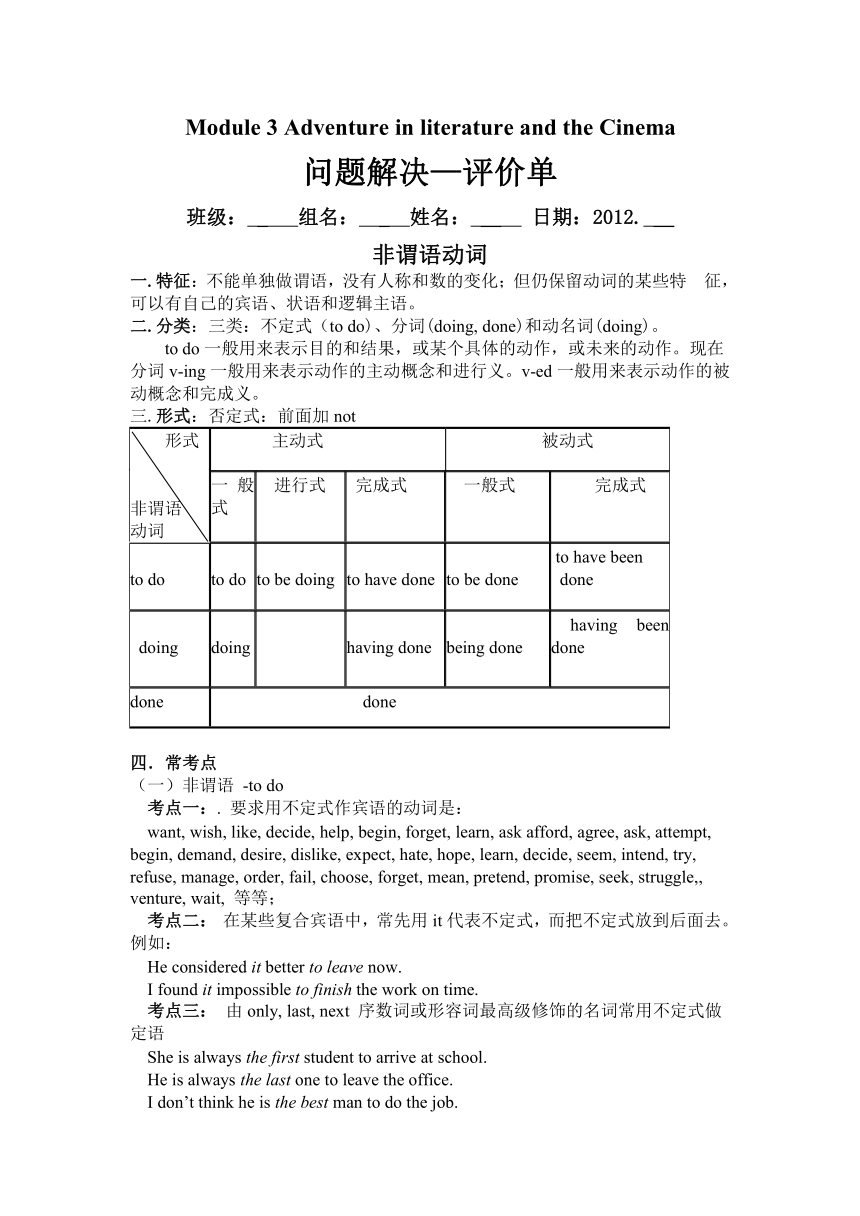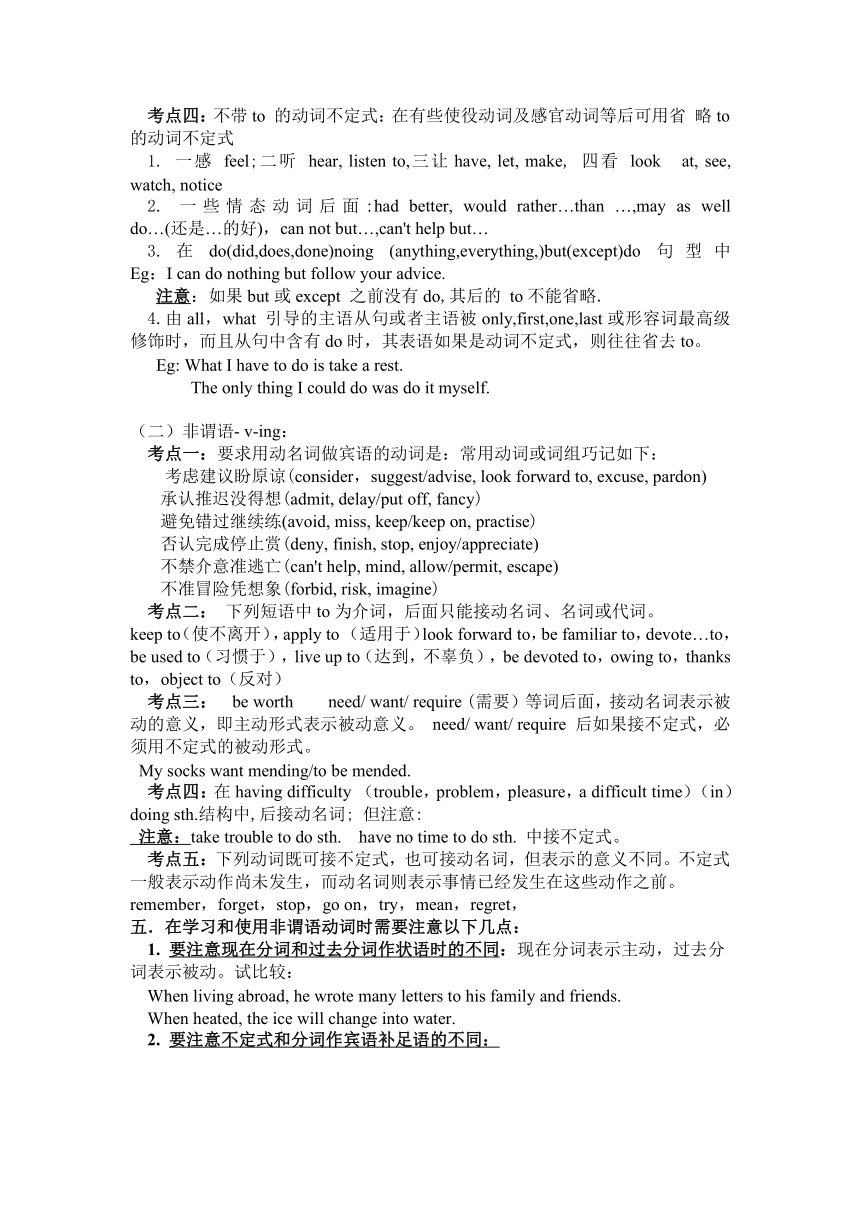Module 3 Adventure in literature and the Cinema 非谓语动词
文档属性
| 名称 | Module 3 Adventure in literature and the Cinema 非谓语动词 |  | |
| 格式 | zip | ||
| 文件大小 | 17.2KB | ||
| 资源类型 | 教案 | ||
| 版本资源 | 外研版 | ||
| 科目 | 英语 | ||
| 更新时间 | 2013-02-22 11:36:56 | ||
图片预览


文档简介
Module 3 Adventure in literature and the Cinema
问题解决—评价单
班级: _ 组名: _ 姓名: __ 日期:2012. __
非谓语动词
一.特征:不能单独做谓语,没有人称和数的变化;但仍保留动词的某些特 征,可以有自己的宾语、状语和逻辑主语。
二.分类:三类:不定式(to do)、分词(doing, done)和动名词(doing)。
to do一般用来表示目的和结果,或某个具体的动作,或未来的动作。现在分词v-ing一般用来表示动作的主动概念和进行义。v-ed一般用来表示动作的被动概念和完成义。
3.形式:否定式:前面加not
形式非谓语动词 主动式 被动式
一般式 进行式 完成式 一般式 完成式
to do to do to be doing to have done to be done to have been done
doing doing having done being done having been done
done done
四.常考点
(1)非谓语 -to do
考点一:. 要求用不定式作宾语的动词是:
want, wish, like, decide, help, begin, forget, learn, ask afford, agree, ask, attempt, begin, demand, desire, dislike, expect, hate, hope, learn, decide, seem, intend, try, refuse, manage, order, fail, choose, forget, mean, pretend, promise, seek, struggle,, venture, wait, 等等;
考点二: 在某些复合宾语中,常先用it代表不定式,而把不定式放到后面去。例如:
He considered it better to leave now.
I found it impossible to finish the work on time.
考点三: 由only, last, next 序数词或形容词最高级修饰的名词常用不定式做定语
She is always the first student to arrive at school.
He is always the last one to leave the office.
I don’t think he is the best man to do the job.
考点四:不带to 的动词不定式:在有些使役动词及感官动词等后可用省 略to的动词不定式
1. 一感 feel;二听 hear, listen to,三让have, let, make, 四看 look at, see, watch, notice
2. 一些情态动词后面:had better, would rather…than …,may as well do…(还是…的好),can not but…,can't help but…
3.在do(did,does,done)noing (anything,everything,)but(except)do句型中 Eg:I can do nothing but follow your advice.
注意:如果but或except 之前没有do,其后的 to不能省略.
4.由all,what 引导的主语从句或者主语被only,first,one,last或形容词最高级修饰时,而且从句中含有do时,其表语如果是动词不定式,则往往省去to。
Eg: What I have to do is take a rest.
The only thing I could do was do it myself.
(二)非谓语- v-ing:
考点一:要求用动名词做宾语的动词是:常用动词或词组巧记如下:
考虑建议盼原谅(consider,suggest/advise, look forward to, excuse, pardon)
承认推迟没得想(admit, delay/put off, fancy)
避免错过继续练(avoid, miss, keep/keep on, practise)
否认完成停止赏(deny, finish, stop, enjoy/appreciate)
不禁介意准逃亡(can't help, mind, allow/permit, escape)
不准冒险凭想象(forbid, risk, imagine)
考点二: 下列短语中to为介词,后面只能接动名词、名词或代词。
keep to(使不离开),apply to (适用于)look forward to,be familiar to,devote…to,be used to(习惯于),live up to(达到,不辜负),be devoted to,owing to,thanks to,object to(反对)
考点三: be worth need/ want/ require (需要)等词后面,接动名词表示被动的意义,即主动形式表示被动意义。 need/ want/ require 后如果接不定式,必须用不定式的被动形式。
My socks want mending/to be mended.
考点四:在having difficulty (trouble,problem,pleasure,a difficult time)(in)doing sth.结构中,后接动名词; 但注意:
注意:take trouble to do sth. have no time to do sth. 中接不定式。
考点五:下列动词既可接不定式,也可接动名词,但表示的意义不同。不定式一般表示动作尚未发生,而动名词则表示事情已经发生在这些动作之前。
remember,forget,stop,go on,try,mean,regret,
五.在学习和使用非谓语动词时需要注意以下几点:
1. 要注意现在分词和过去分词作状语时的不同:现在分词表示主动,过去分词表示被动。试比较:
When living abroad, he wrote many letters to his family and friends.
When heated, the ice will change into water.
2. 要注意不定式和分词作宾语补足语的不同:
在感官动词(see, watch, hear, feel, notice等)后既可用不带to 的不定式做宾语补语,也可用现在分词做宾补。两者中间有时是有差别的。用现在分词时,表示动作正在发生,用不定式时,表示动作发生了,即动作全部结束了。例如:
A: Do you hear someone knocking at the door
B: Yes, I did. I heard him knock three times.
3. 不定式和分词作定语时的区别,不定式作定语时,不定式和所修饰的名词在意义上有动宾关系,因此,如果不定式是不及物动词,后面就应有必要的介词。如果是分词作定语, 则被修饰的名词和分词之间有主谓关系。例如:
Give me a piece of paper to write on.
All of us look forward to the coming holiday.
4. 动名词和不定式做主语和表语时的区别。一般来说,在表示比较抽象的一般的行为时,多用动名词, 表示具体某次动作,特别是将来的动作时,多用不定式。例如:
Reading without thorough comprehension is no good.
It is quite necessary to read it many times.
6.巩固检测
1. Helen had to shout ________ above the sound of the music.
A. making herself hear B. to make herself hear
C. making herself heard D. to make herself heard
2. The man insisted ________ a taxi for me even though I told him I lived nearby.
A. find B. to find C. on finding D. in finding
3. The old man, ________ abroad for twenty years, is on the way back to his
motherland.
A. to work B. working C. to have worked D. having worked
4. Don’t leave the water ________ while you brush your teeth.
A. run B. running C. being run D. to run
5. When finally ______ to the market, these products enjoyed great success.
A. introducing B. introduced C. introduce D. being introduced
6. “We can’t go out in this weather,” said Bob, ________ out of the window.
A. looking B. to look C. looked D. having looked
7. Sarah, hurry up. I’m afraid you can’t have time to ________ before the party.
A. get changed B. get change C. get changing D. get to change
8. The news reporters hurried to the airport, only _______the film stars had left.
A. to tell B. to be told C. telling D. told
9. Having been ill in bed for nearly a month, he had a hard time _____ the exam.
A. pass B. to pass C. passed D. passing
10. _____with the size of the whole earth, the biggest ocean doesn’t seem big at all.
A. Compare B. When comparing C. Comparing D. When compared
11.____ the programme, they have to stay there for another two weeks.
A. Not completing B. Not completed
C. Not having completed D. Having not completed
12. If you are planning to spend your money having fun this week, better
____it—you’ve got some big bills coming.
A. forget B. forgot C. forgetting D. to forget
13. According to a recent U. S. survey, children spend up to 25 hours a week
________ TV.
A.watching B. to watch C. having watch D. be watched
14. The flowers ________ sweet in the botanic garden attract the visitors to the beauty of nature.
A. to smell B. smelling C. smelt D. to be smelt
15. The managers discussed the plan that they would like to see ____the next year.
A. carried out B. carrying out C. carry out D. to carry out
自我评价 小组长评价 学科长评价
A.全会做的 A.掌握的 A.完善好的
B.粗心做错的 B.待掌握的 B.待完善的
C.全不会做的
问题解决—评价单
班级: _ 组名: _ 姓名: __ 日期:2012. __
非谓语动词
一.特征:不能单独做谓语,没有人称和数的变化;但仍保留动词的某些特 征,可以有自己的宾语、状语和逻辑主语。
二.分类:三类:不定式(to do)、分词(doing, done)和动名词(doing)。
to do一般用来表示目的和结果,或某个具体的动作,或未来的动作。现在分词v-ing一般用来表示动作的主动概念和进行义。v-ed一般用来表示动作的被动概念和完成义。
3.形式:否定式:前面加not
形式非谓语动词 主动式 被动式
一般式 进行式 完成式 一般式 完成式
to do to do to be doing to have done to be done to have been done
doing doing having done being done having been done
done done
四.常考点
(1)非谓语 -to do
考点一:. 要求用不定式作宾语的动词是:
want, wish, like, decide, help, begin, forget, learn, ask afford, agree, ask, attempt, begin, demand, desire, dislike, expect, hate, hope, learn, decide, seem, intend, try, refuse, manage, order, fail, choose, forget, mean, pretend, promise, seek, struggle,, venture, wait, 等等;
考点二: 在某些复合宾语中,常先用it代表不定式,而把不定式放到后面去。例如:
He considered it better to leave now.
I found it impossible to finish the work on time.
考点三: 由only, last, next 序数词或形容词最高级修饰的名词常用不定式做定语
She is always the first student to arrive at school.
He is always the last one to leave the office.
I don’t think he is the best man to do the job.
考点四:不带to 的动词不定式:在有些使役动词及感官动词等后可用省 略to的动词不定式
1. 一感 feel;二听 hear, listen to,三让have, let, make, 四看 look at, see, watch, notice
2. 一些情态动词后面:had better, would rather…than …,may as well do…(还是…的好),can not but…,can't help but…
3.在do(did,does,done)noing (anything,everything,)but(except)do句型中 Eg:I can do nothing but follow your advice.
注意:如果but或except 之前没有do,其后的 to不能省略.
4.由all,what 引导的主语从句或者主语被only,first,one,last或形容词最高级修饰时,而且从句中含有do时,其表语如果是动词不定式,则往往省去to。
Eg: What I have to do is take a rest.
The only thing I could do was do it myself.
(二)非谓语- v-ing:
考点一:要求用动名词做宾语的动词是:常用动词或词组巧记如下:
考虑建议盼原谅(consider,suggest/advise, look forward to, excuse, pardon)
承认推迟没得想(admit, delay/put off, fancy)
避免错过继续练(avoid, miss, keep/keep on, practise)
否认完成停止赏(deny, finish, stop, enjoy/appreciate)
不禁介意准逃亡(can't help, mind, allow/permit, escape)
不准冒险凭想象(forbid, risk, imagine)
考点二: 下列短语中to为介词,后面只能接动名词、名词或代词。
keep to(使不离开),apply to (适用于)look forward to,be familiar to,devote…to,be used to(习惯于),live up to(达到,不辜负),be devoted to,owing to,thanks to,object to(反对)
考点三: be worth need/ want/ require (需要)等词后面,接动名词表示被动的意义,即主动形式表示被动意义。 need/ want/ require 后如果接不定式,必须用不定式的被动形式。
My socks want mending/to be mended.
考点四:在having difficulty (trouble,problem,pleasure,a difficult time)(in)doing sth.结构中,后接动名词; 但注意:
注意:take trouble to do sth. have no time to do sth. 中接不定式。
考点五:下列动词既可接不定式,也可接动名词,但表示的意义不同。不定式一般表示动作尚未发生,而动名词则表示事情已经发生在这些动作之前。
remember,forget,stop,go on,try,mean,regret,
五.在学习和使用非谓语动词时需要注意以下几点:
1. 要注意现在分词和过去分词作状语时的不同:现在分词表示主动,过去分词表示被动。试比较:
When living abroad, he wrote many letters to his family and friends.
When heated, the ice will change into water.
2. 要注意不定式和分词作宾语补足语的不同:
在感官动词(see, watch, hear, feel, notice等)后既可用不带to 的不定式做宾语补语,也可用现在分词做宾补。两者中间有时是有差别的。用现在分词时,表示动作正在发生,用不定式时,表示动作发生了,即动作全部结束了。例如:
A: Do you hear someone knocking at the door
B: Yes, I did. I heard him knock three times.
3. 不定式和分词作定语时的区别,不定式作定语时,不定式和所修饰的名词在意义上有动宾关系,因此,如果不定式是不及物动词,后面就应有必要的介词。如果是分词作定语, 则被修饰的名词和分词之间有主谓关系。例如:
Give me a piece of paper to write on.
All of us look forward to the coming holiday.
4. 动名词和不定式做主语和表语时的区别。一般来说,在表示比较抽象的一般的行为时,多用动名词, 表示具体某次动作,特别是将来的动作时,多用不定式。例如:
Reading without thorough comprehension is no good.
It is quite necessary to read it many times.
6.巩固检测
1. Helen had to shout ________ above the sound of the music.
A. making herself hear B. to make herself hear
C. making herself heard D. to make herself heard
2. The man insisted ________ a taxi for me even though I told him I lived nearby.
A. find B. to find C. on finding D. in finding
3. The old man, ________ abroad for twenty years, is on the way back to his
motherland.
A. to work B. working C. to have worked D. having worked
4. Don’t leave the water ________ while you brush your teeth.
A. run B. running C. being run D. to run
5. When finally ______ to the market, these products enjoyed great success.
A. introducing B. introduced C. introduce D. being introduced
6. “We can’t go out in this weather,” said Bob, ________ out of the window.
A. looking B. to look C. looked D. having looked
7. Sarah, hurry up. I’m afraid you can’t have time to ________ before the party.
A. get changed B. get change C. get changing D. get to change
8. The news reporters hurried to the airport, only _______the film stars had left.
A. to tell B. to be told C. telling D. told
9. Having been ill in bed for nearly a month, he had a hard time _____ the exam.
A. pass B. to pass C. passed D. passing
10. _____with the size of the whole earth, the biggest ocean doesn’t seem big at all.
A. Compare B. When comparing C. Comparing D. When compared
11.____ the programme, they have to stay there for another two weeks.
A. Not completing B. Not completed
C. Not having completed D. Having not completed
12. If you are planning to spend your money having fun this week, better
____it—you’ve got some big bills coming.
A. forget B. forgot C. forgetting D. to forget
13. According to a recent U. S. survey, children spend up to 25 hours a week
________ TV.
A.watching B. to watch C. having watch D. be watched
14. The flowers ________ sweet in the botanic garden attract the visitors to the beauty of nature.
A. to smell B. smelling C. smelt D. to be smelt
15. The managers discussed the plan that they would like to see ____the next year.
A. carried out B. carrying out C. carry out D. to carry out
自我评价 小组长评价 学科长评价
A.全会做的 A.掌握的 A.完善好的
B.粗心做错的 B.待掌握的 B.待完善的
C.全不会做的
